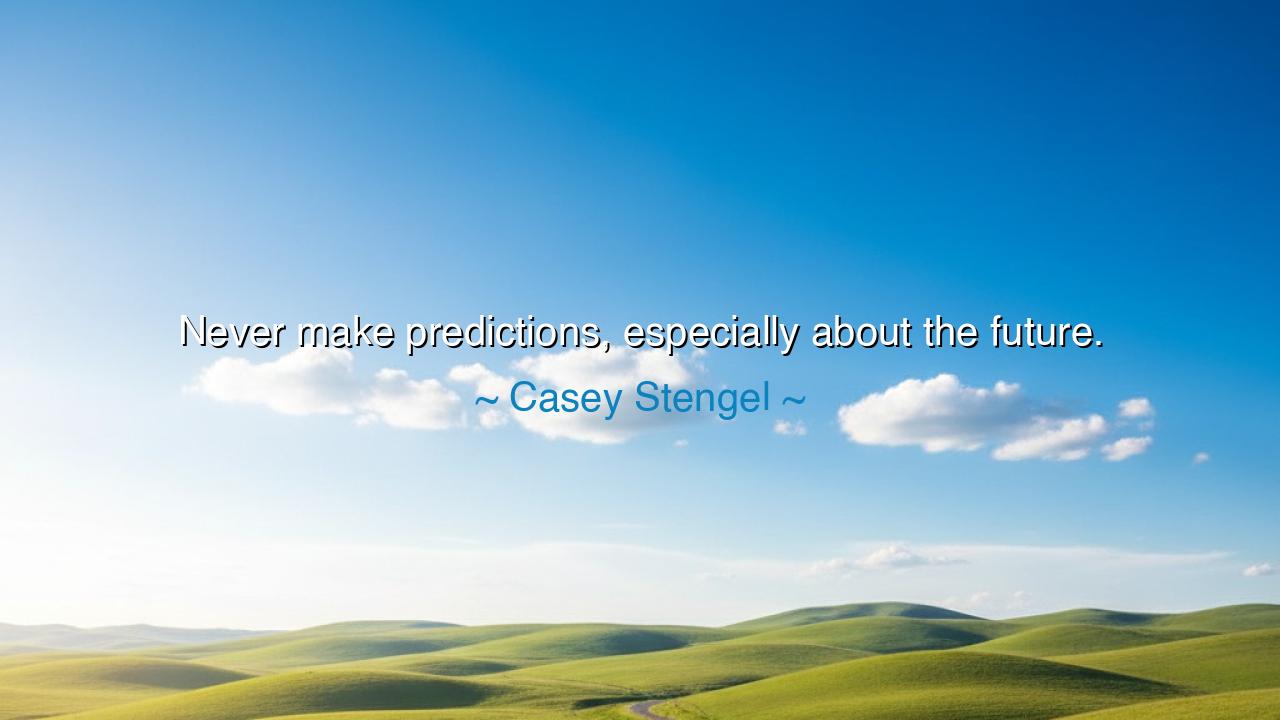
Never make predictions, especially about the future.






"Never make predictions, especially about the future." These words by Casey Stengel, a legendary figure in the world of baseball, encapsulate a profound and often overlooked truth about human nature and the limits of our understanding. Stengel, known for his wit and wisdom, reminds us of the unpredictability of life and the inherent folly in trying to predict something as uncertain as the future. While it is natural for humans to seek certainty and control, Stengel's words echo a deeper understanding—that the future is not ours to predict, and often, our best-laid plans are subject to forces beyond our control.
In the ancient world, the idea of predicting the future was often tied to the concept of fate and divine will. The Greeks believed that the future was influenced by the gods, who could sometimes grant mortals a glimpse into what lay ahead, but these glimpses were often ambiguous and uncertain. In the Iliad, for instance, the Greek hero Achilles struggles with the knowledge of his future death, but despite knowing what was to come, he could not alter the course of events. His fate was sealed. Similarly, the Oracle of Delphi, often consulted by the ancient Greeks for insight into the future, would provide cryptic answers, reminding those who sought her wisdom that the future was far from certain. The Greeks understood that even with the wisdom of the gods, the future remained an enigma, an unknown path that could not be easily predicted or controlled.
The Romans held a similar view of fate. Figures like Seneca, the Stoic philosopher, emphasized that human beings had limited control over what would happen in the future. In his writings, Seneca often stated that people should focus on what is within their control—their actions, attitudes, and decisions—rather than obsessing over the uncertainty of the future. His belief was that by accepting uncertainty and focusing on the present moment, individuals could lead a life of virtue and peace. The idea of predicting the future, in the Stoic mindset, was seen as both unwise and counterproductive. Seneca’s wisdom teaches us that while we may speculate on the future, it is our actions today that ultimately shape our lives.
Stengel’s quote reflects this ancient wisdom, reminding us that predicting the future is ultimately an exercise in futility. Just as Socrates taught that self-knowledge was the key to a meaningful life, Stengel suggests that humility before the uncertainty of the future is essential. Prediction, especially regarding something as unpredictable as the future, only invites frustration, confusion, and disappointment. The future is shaped by so many forces—both seen and unseen—that attempting to make definitive predictions about it is not only impossible but often unhelpful. Instead of trying to control the uncontrollable, we should focus on the present, making the best choices we can with the knowledge and resources we have.
Consider the story of Sir Isaac Newton, one of the greatest minds in history, who despite his immense intellect and contributions to science, understood the limits of human knowledge. Newton once said, “I do not know what I may appear to the world, but to myself I seem to have been only a boy playing on the seashore, diverting myself in now and then finding a smoother pebble or a prettier shell than ordinary, while the great ocean of truth lay all undiscovered before me.” Despite his revolutionary work in mathematics and physics, Newton recognized that there were limits to what he, or anyone else, could predict about the future, especially in the vast ocean of unknowns. His words echo the truth behind Stengel’s quote—no matter how much we know, the future remains a mystery.
This idea of uncertainty is critical to how we approach life today. In our world, people often feel the need to have a plan, to predict the future, and to control outcomes. From financial investments to personal goals, we place great stock in the ability to foresee what will happen next. But Stengel’s words call us to embrace uncertainty and to recognize that the most meaningful moments in life often come from spontaneity, from the unexpected turns that life takes. It is not in the prediction of the future that we find meaning, but in how we respond to the unknown and how we adapt to the challenges and opportunities that arise.
The lesson from Stengel’s words is one of humility and acceptance. We are not meant to control the future, but to live fully in the present, making decisions that reflect our values, our desires, and our capacity for growth. Instead of focusing on what we cannot predict, we can embrace the uncertainty of the future as an invitation to live with freedom and resilience. Life’s most significant moments, and the paths we take, are often shaped by chance and unexpected changes, not by rigid predictions. Just as the ancients taught us, we must face the unknown with grace, adaptability, and a deep understanding that the journey is often more important than the destination.
In your own life, ask yourself: are you trying to predict the future, or are you focusing on how you respond to the present moment? Are you so fixated on what may happen that you are missing the opportunities in front of you? Embrace the uncertainty of life, and live with purpose in each moment. Make your choices today, for while the future is unpredictable, the present is where you hold the power to shape your life. Instead of chasing certainty, choose to live fully in the now, knowing that the future will unfold in its own time, in ways you can neither predict nor control.






AAdministratorAdministrator
Welcome, honored guests. Please leave a comment, we will respond soon